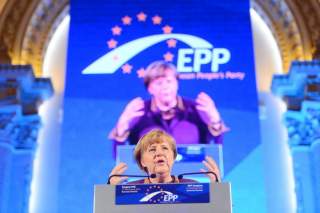Germany's Fatal Flaw: Strategic Blindness
"In short, Germany failed to consider the strategic risk its Ukraine policy presented for itself and its neighbors and allies."
With the outrage that has followed MH17, Steinmeier has in recent days turned to scolding the rebels for their unwillingness to lay down their weapons. Fair enough. But until last week, it was Poroshenko in Kiev whom Germany mainly thought necessary to restrain.
Thus, when the Ukrainian army recaptured Slavyansk earlier this month, Germany anxiously urged Ukraine “to retain a sense of proportion in its dealings with separatists and to avoid civilian casualties”—apparently forgetting that effective control of state territory was a fundamental element of sovereignty.
Berlin’s push for a cease-fire even went to Rio, where Merkel apparently reiterated Germany’s approach in a meeting with Putin just hours before Germany took the field against Argentina.
Lost perhaps forever now in the wreckage of MH17 is the Russlandversteher’s fundamentally sound strategic insight—that the only durable settlement in Ukraine will be one that protects Russia’s core interests.
Yet Germany should have joined all these dots before offering Yanukovych the Association Agreement that so irked the Kremlin. As it is, when a German government calls on a neighbor not to exercise sovereign authority over the full extent of its territory, in favor of negotiations with the proxies of a power with open designs on its territory, it can only invite unwanted associations. It’s a wonder Berlin has any credibility left east of the Oder.
Worse, Germany’s botched Ukraine policy was the result of the neglect of Eastern Europe that has characterized Merkel’s chancellorship, as well as Berlin’s tendency to deal unilaterally with Moscow that has infuriated neighbors from Warsaw to Riga—and makes a mockery of naïve praise for Germany’s supposed collaborative instincts.
This last might tell us something about Germany’s other foreign-policy failure this summer—its espionage-strained relationship with America. For all Merkel’s professed Atlanticism, Germany’s transatlantic teamwork has been strangely unilateral, too. Forget Germany’s refusal to contribute either to NATO’s Libya campaign or French counterterrorism operations in Mali. Last month, Berlin cut €800m from its defense budget over the top of American protests—despite Germany’s rude economic health and a regional crisis in Ukraine that Berlin did as much as anyone to sow.
Given its unique power, wealth and influence, especially in Eastern Europe, Germany’s chaotic foreign policy says much about the country’s weakness in real strategic thought.
But it speaks volumes more about the world’s low expectations of Berlin that it has yet to be called to account for its role in Ukraine.
Perversely, it’s fêted.
According to the New York Times’ Roger Cohen, Germany “doesn’t believe in quick fixes,” in part because “the German time frame is longer.” But Germany’s Ukraine policy bears none of the
hallmarks of “planning,” “persistence” or “prudence” for which he lavishly praises the country’s footballers.
Try parochialism, naivety and unaccountability instead.
Today, most historians agree that Germany wasn’t looking for a war—let alone a world war—in
1914, but stumbled accidentally into one: the famous “blank cheque” German chancellor Bethmann-Hollweg gave the Austrians (and which emboldened them to deliver an ultimatum so harsh that Belgrade would have to reject it) was predicated on the wrong assumption that any resulting war would be easily localizable—a small affair between Austria and Serbia in the Balkans.
In his remarkable new account of Europe’s descent into the First World War, the Cambridge historian Christopher Clark describes some of the leading decision makers as “hedgehogs scurrying across the road with their eyes blind to the traffic.” He was talking about Vienna, but the same could be said of Berlin, where Germany’s leaders fatally miscalculated how their huge Russian neighbor would interpret their actions.
For tragic reasons, the eyes of the world are riveted with disgust and horror on Ukraine, as a century ago they were on Serbia. It’s tempting to argue that, once again, it’s not just strategic instability on Europe’s periphery that’s the problem—it’s a lack of strategic foresight at its center.
Matthew Dal Santo is a foreign affairs analyst based in Copenhagen, Denmark. He has commented on European, North Asian and Middle Eastern affairs for the Australian Broadcasting Corporation (ABC) and previously worked for the Australian Department of Foreign Affairs’ Policy Planning Branch. Educated at the Universities of Sydney (Australia) and Cambridge (England), he was a postdoctoral Research Fellow in European history at Trinity College, Cambridge.
Image: Flickr/European People's Party-EPP/CC by 2.0

